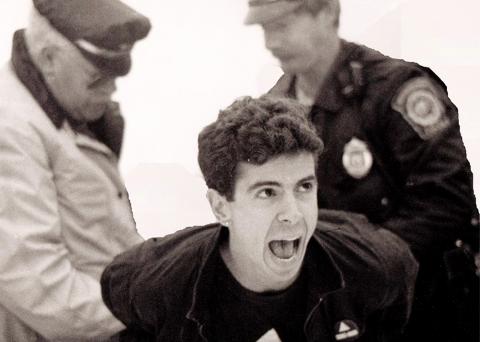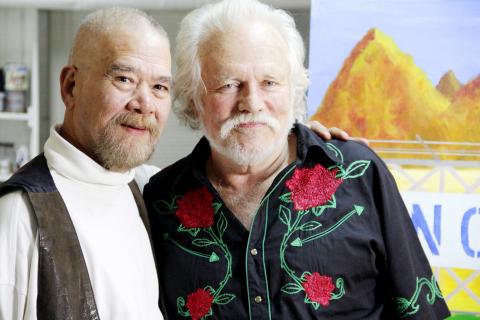While the LGBT community eagerly anticipates the 12th Taiwan LGBT Pride (台灣同志遊行) parade set for Oct. 25, the Taiwan International Queer Film Festival (台灣國際酷兒影展, TIQFF) launches its first edition this weekend with a lineup of 60 feature, documentary and short works from 30 countries. With venues in Taipei and Greater Kaohsiung, the festival aims to bring more visibility to the LGBT community through audience-friendly films, a competition and a production workshop given by industry professionals from Taiwan, South Korea and the US.
“People think gay men are all about flesh and parties ... We want to show that there is a lot more going on than partying, and that there are a lot more sexual and gender identities than gay and lesbian,” festival co-director Jay Lin (林志杰) told the Taipei Times.
The festival will screen works that address a wide range of issues and topics faced by not only gays, but transsexuals, cross-dressers and other gender-variant people. Topics include family, aging, relationships and HIV/AIDS. While conservative Christians may find it hard to believe, some actually offer wholesome, family entertainment.

Photo courtesy of TIQFF
G.B.F., for example, is an American teen comedy about a gay teenager fought over by three popular girls, who all agree that a “gay best friend” is the trendiest personal accessory.
The award-winning documentary How to Survive a Plague compellingly documents the early days of the AIDS epidemic and the struggles Aids Coalition to Unleash Power (Act Up) had with authorities.
Peter Staley, founder of Act Up affiliate Treatment Action Group and who is featured prominently in the documentary, will attend question-and-answer sessions as well as forums joined by local LGBT-rights activists and NGO leaders.

Photo courtesy of TIQFF
Apart from film screenings, festival organizers hope to establish a network among filmmakers and industry movers and shakers.
Taiwan International Media and Education Association (台灣國際影音與教育協會) and Portico Media (杰德影音), a media production and distribution company, will collaborate to discuss the importance of producing LGBT-related projects within the media industry.
“Taipei is considered one of the most open and liberal cities in Asia, but there are relatively few LGBT-themed films made here ... We want to set up a platform through which filmmakers and other professionals can develop material, seek funding or network,” says Lin, who is the CEO of Portico Media.

Photo courtesy of TIQFF
QUEER AWARDS
To discover and encourage new talent, the Taiwan Queer Awards (台灣酷兒獎) was launched to recognize excellence in short filmmaking in Chinese-speaking regions. Five works — all Taiwanese productions — were nominated. The award ceremony will take place on Oct. 5 in Greater Kaohsiung.
Meanwhile, an intense, two-day workshop intended for local filmmakers will focus on the production and distribution of LGBT-related works, as well as specialized topics such as how to generate LGBT content that appeals to mainstream audiences.

Photo courtesy of TIQFF
Participating speakers include television and film producer and director Kim Jho Gwang-soo from South Korea, whose four gay-themed shorts and debut feature, Two Weddings and a Funeral, will be shown at the festival, and Stephen Israel, the prolific producer behind G.B.F..
Taiwan-born, San Francisco-based filmmaker Leo Chiang (江松長) will share his experience of co-producing Limited Partnership, a documentary about one of the first legally married same-sex couples in the US. The film is on the festival’s lineup.
Lin says that the production of LGBT-related films and other media is a global trend.
“According to a report I did in March, 17 out of the top 20 TV shows in the US have gay characters or gay actors. If we take Hollywood as a trend, it will spill over to Asia, and I think the spillover to Taiwan will be the fastest [among other Asian countries],” Lin says.
“This festival doesn’t have to be fringe, but offers mainstream LGBT content for more people to see and, hopefully, helps more people to stop worrying about making LGBT works that don’t sell,” he adds.

April 14 to April 20 In March 1947, Sising Katadrepan urged the government to drop the “high mountain people” (高山族) designation for Indigenous Taiwanese and refer to them as “Taiwan people” (台灣族). He considered the term derogatory, arguing that it made them sound like animals. The Taiwan Provincial Government agreed to stop using the term, stating that Indigenous Taiwanese suffered all sorts of discrimination and oppression under the Japanese and were forced to live in the mountains as outsiders to society. Now, under the new regime, they would be seen as equals, thus they should be henceforth

Last week, the the National Immigration Agency (NIA) told the legislature that more than 10,000 naturalized Taiwanese citizens from the People’s Republic of China (PRC) risked having their citizenship revoked if they failed to provide proof that they had renounced their Chinese household registration within the next three months. Renunciation is required under the Act Governing Relations Between the People of the Taiwan Area and the Mainland Area (臺灣地區與大陸地區人民關係條例), as amended in 2004, though it was only a legal requirement after 2000. Prior to that, it had been only an administrative requirement since the Nationality Act (國籍法) was established in

With over 80 works on display, this is Louise Bourgeois’ first solo show in Taiwan. Visitors are invited to traverse her world of love and hate, vengeance and acceptance, trauma and reconciliation. Dominating the entrance, the nine-foot-tall Crouching Spider (2003) greets visitors. The creature looms behind the glass facade, symbolic protector and gatekeeper to the intimate journey ahead. Bourgeois, best known for her giant spider sculptures, is one of the most influential artist of the twentieth century. Blending vulnerability and defiance through themes of sexuality, trauma and identity, her work reshaped the landscape of contemporary art with fearless honesty. “People are influenced by

The remains of this Japanese-era trail designed to protect the camphor industry make for a scenic day-hike, a fascinating overnight hike or a challenging multi-day adventure Maolin District (茂林) in Kaohsiung is well known for beautiful roadside scenery, waterfalls, the annual butterfly migration and indigenous culture. A lesser known but worthwhile destination here lies along the very top of the valley: the Liugui Security Path (六龜警備道). This relic of the Japanese era once isolated the Maolin valley from the outside world but now serves to draw tourists in. The path originally ran for about 50km, but not all of this trail is still easily walkable. The nicest section for a simple day hike is the heavily trafficked southern section above Maolin and Wanshan (萬山) villages. Remains of